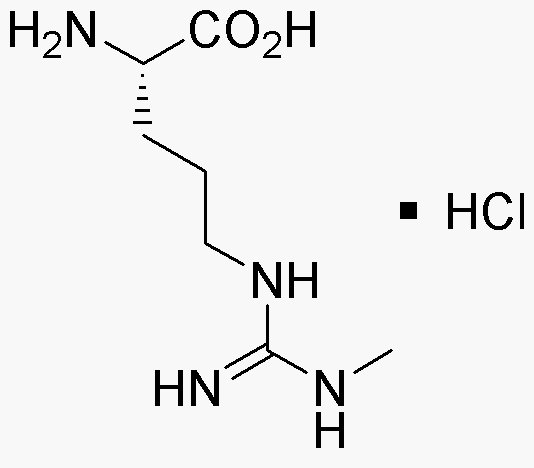Nw-Methyl-L-arginine hydrochloride is widely utilized in research focused on:
- Cardiovascular Research: This compound is often used to study nitric oxide synthesis and its implications in cardiovascular diseases, helping researchers understand blood flow regulation and hypertension.
- Neuroscience: It serves as a valuable tool in investigating the role of nitric oxide in neurotransmission, aiding in the exploration of neurodegenerative diseases and potential treatments.
- Pharmacology: Researchers utilize it to assess the effects of nitric oxide modulation on various drug responses, providing insights into drug design and efficacy.
- Metabolic Studies: The compound is applied in studies examining metabolic pathways, particularly those involving arginine metabolism, which can lead to advancements in metabolic disorder treatments.
- Biochemistry: It is used in enzyme inhibition studies, specifically targeting nitric oxide synthase, which can enhance understanding of enzyme regulation and its therapeutic potential.
General Information
Properties
Safety and Regulations
Applications
Nw-Methyl-L-arginine hydrochloride is widely utilized in research focused on:
- Cardiovascular Research: This compound is often used to study nitric oxide synthesis and its implications in cardiovascular diseases, helping researchers understand blood flow regulation and hypertension.
- Neuroscience: It serves as a valuable tool in investigating the role of nitric oxide in neurotransmission, aiding in the exploration of neurodegenerative diseases and potential treatments.
- Pharmacology: Researchers utilize it to assess the effects of nitric oxide modulation on various drug responses, providing insights into drug design and efficacy.
- Metabolic Studies: The compound is applied in studies examining metabolic pathways, particularly those involving arginine metabolism, which can lead to advancements in metabolic disorder treatments.
- Biochemistry: It is used in enzyme inhibition studies, specifically targeting nitric oxide synthase, which can enhance understanding of enzyme regulation and its therapeutic potential.
Documents
Safety Data Sheets (SDS)
The SDS provides comprehensive safety information on handling, storage, and disposal of the product.
Product Specification (PS)
The PS provides a comprehensive breakdown of the product’s properties, including chemical composition, physical state, purity, and storage requirements. It also details acceptable quality ranges and the product's intended applications.
Certificates of Analysis (COA)
Search for Certificates of Analysis (COA) by entering the products Lot Number. Lot and Batch Numbers can be found on a product’s label following the words ‘Lot’ or ‘Batch’.
Numéro de catalogue
Numéro de lot/série
Certificates Of Origin (COO)
This COO confirms the country where the product was manufactured, and also details the materials and components used in it and whether it is derived from natural, synthetic, or other specific sources. This certificate may be required for customs, trade, and regulatory compliance.
Numéro de catalogue
Numéro de lot/série
Safety Data Sheets (SDS)
The SDS provides comprehensive safety information on handling, storage, and disposal of the product.
DownloadProduct Specification (PS)
The PS provides a comprehensive breakdown of the product’s properties, including chemical composition, physical state, purity, and storage requirements. It also details acceptable quality ranges and the product's intended applications.
DownloadCertificates of Analysis (COA)
Search for Certificates of Analysis (COA) by entering the products Lot Number. Lot and Batch Numbers can be found on a product’s label following the words ‘Lot’ or ‘Batch’.
Numéro de catalogue
Numéro de lot/série
Certificates Of Origin (COO)
This COO confirms the country where the product was manufactured, and also details the materials and components used in it and whether it is derived from natural, synthetic, or other specific sources. This certificate may be required for customs, trade, and regulatory compliance.


